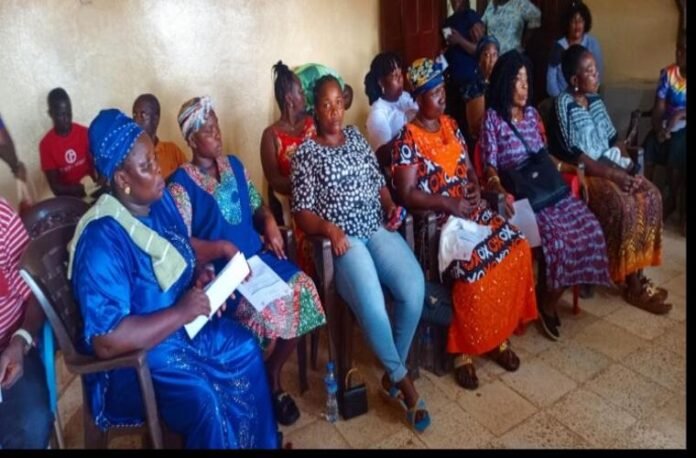MONROVIA, LIBERIA- The Women NGO Secretariat of Liberia (WONGOSOL) has officially begun the distribution of livelihood support materials to beneficiaries of the Liberia Fight FGM Project.
The project is a three-year initiative funded by the UN Trust Fund to End Violence Against Women.
The initiative, which commenced in October 2023, is designed to empower survivors of Female Genital Mutilation (FGM) in Montserrado, Cape Mount, Bong, Margibi, Bomi, and Gbarpolu Counties through economic empowerment, awareness-raising, and collective advocacy.
The project works directly in forty-four communities to accelerate the permanent abandonment of FGM and other harmful traditional practices.
Recently, WONGOSOL officially distributed items in Kakata, Margibi County, and Clay-Ashland, Montserrado County, with the participation of local county authorities, WEDOL, and Insure Empowerment Humanity officials, the Chairperson of the Women Legislative Caucus, and Representative of District-Three in Margibi County, Ellen Attoh Wreh, Clay-Ashland Mayor Theodosia Kwenah, among others.
The materials being distributed include a wide range of agriculture, baking, soap-making, and small business start-up tools such as wheelbarrows, seeds, hoes, flour, sugar, butter, milk, spices, palm oil, essential oils, medicinal herbs, soap molds, protective gear, Sodium Hydroxides, Potassium Hydroxides, baking pans, etc.
Speaking during the distribution exercise in both Kakata and Clay-Ashland in Montserrado County, the Executive Director of the Women NGO Secretariat Organization of Liberia, Esther Yango, emphasized that ending FMG is critical to empower women and families whose livelihoods were tied to harmful traditional practices in these six project-targeted counties.
Mrs. Yango said,” Women and girls need to take some bold steps to take on major leadership positions in the respective areas, and must be involved in activities that will contribute meaningfully to their families”.
She praised President Boakai for pledging to enact a permanent national law to ban female genital mutilation (FGM) and other harmful cultural practices.
President Boakai’s statement at the 30th Anniversary of the Fourth World Conference on Women is a significant victory for women’s rights advocates, who have long sought permanent legal protections.
While previous governments had implemented temporary bans, inconsistent enforcement left women and girls vulnerable.
President Boakai’s move, when implemented, would make Liberia one of the few African nations to codify such protections into law.
These materials will support Liberian women in establishing sustainable livelihoods, ensuring that economic alternatives are available for those transitioning away from harmful traditional practices.
While in Kakata, the Women Legislative Caucus Chair and Margibi County District-Three Representative Ellen Attoh Wreh, thanked WONGOSOL and its partners for empowering women of the county, highlighting her office’s support for such an initiative.
Representative Wreh called on the beneficiaries to embrace the initiative, stressing that such an effort will create space for more opportunities for women in ending FGM across the country.
She disclosed that the Caucus has received One Million USD to provide loans to women in several counties.
“We want to thank WONGOSOL, and UN Trust Fund, and every partnering organization for their support to the women of Margibi County”.
As the largest women-led civil society network in Liberia, the Women NGOs Secretariat of Liberia (WONGOSOL) coordinates over 250 organizations across all fifteen counties.
Since its establishment in 1998, WONGOSOL has worked to amplify women’s voices, continue to amplify its fight to end violence against women and girls, and promote gender equality and inclusive governance.
Representing Margibi County local authorities, Superintendent OJ Morris lauded the initiative, highlighting the government’s efforts in addressing traditional practices across the country.
Superintendent Morris said,” The empowerment of women is crucial to help support their husbands and daily home activities”.
For the Mayor of Clay-Ashland, Theodosia Kwenah, the project will be a great help to single mothers, widows, especially those who have been affected by harmful traditional practices in the area.
Mayor Kwenah, at the same time, pledged to collaborate with the women to ensure they use the items for their intended purpose.
She also emphasized that for too long the women of Clay-Ashland have been left out of these kinds of initiatives, but extended thanks to WONGOSOL, Insure Empowerment Humanity, and the United Nations Trust Fund for breaking such barriers.
These projects are critical to empower and educate women and girls in the project-targeted communities.
Officials of the distribution revealed that the beneficiaries were trained by facilitators, who have equipped them to do better with the materials received.
Receiving the items, the beneficiaries expressed appreciation to the UN Trust Fund and WONGOSOL for their continuous support.
They pleaded for WONGOSOL’s advocacy in helping them secure a permanent structure, where they can sell their products, indicating that such a facility would greatly enhance the sustainability of their efforts.
The beneficiaries from both Kakata and Clay-Ashland highlighted that the project has brought significant impact in the lives of many others in their respective communities.
Economic empowerment is a critical tool in ending harmful traditional practices, mostly FGM, but it needs the urgent support of all women’s groups.

